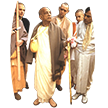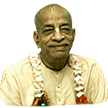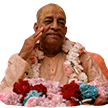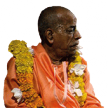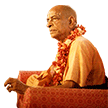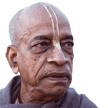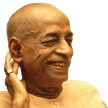Undisturbed - an essential subject: Difference between revisions
(Created page with "Category:Essential Subjects <!----------------------- edit below this line -----------------------> <!------------------------ begin introduction text below --------------...") |
(Vanibot #0041: Moves Choose Another box to the end) |
||
| Line 2: | Line 2: | ||
<!----------------------- edit below this line -----------------------> | <!----------------------- edit below this line -----------------------> | ||
<!------------------------ begin introduction text below ------------------------> | <!------------------------ begin introduction text below ------------------------> | ||
Those who have been trained for abstinence in material pleasures are called dhīra, or men undisturbed by the senses. Only these dhīras can accept the orders of sannyāsa, and they can gradually rise to the status of the paramahaṁsa, which is adored by all members of society. King Ṛṣabha propagated this mission, and at the last stage He became completely aloof from the material bodily needs, which is a rare stage not to be imitated by foolish men, but to be worshiped by all. | |||
Srila Prabhupada's books, lectures, conversations and letters offer a comprehensive presentation of this essential subject as seen in the Vaniquotes '''[[Vaniquotes:Category:Undisturbed|Undisturbed]]''' category. An introduction from his books is given below in the following | Srila Prabhupada's books, lectures, conversations and letters offer a comprehensive presentation of this essential subject as seen in the Vaniquotes '''[[Vaniquotes:Category:Undisturbed|Undisturbed]]''' category. An introduction from his books is given below in the following 8 quotes. | ||
<!-------- end introduction text and don't touch next three lines ---------> | <!-------- end introduction text and don't touch next three lines ---------> | ||
== Quotes from Srila Prabhupada's books == | == Quotes from Srila Prabhupada's books == | ||
<!----------------- edit quote boxes below this line -----------------> | <!----------------- edit quote boxes below this line -----------------> | ||
{{VaniQuotebox| | {{VaniQuotebox|The opulences of devotees are fixed because devotees are eternally fixed in the Vaikuntha atmosphere, which is called santa-rupa because it is in the mode of pure goodness, undisturbed by the modes of passion and ignorance|The opulences of devotees are fixed because devotees are eternally fixed in the Vaikuṇṭha atmosphere, which is called śānta-rūpa because it is in the mode of pure goodness, undisturbed by the modes of passion and ignorance. Once one is fixed in the devotional service of the Lord, his position of transcendental service cannot be destroyed, and the pleasure and service simply increase unlimitedly. For the devotees engaged in Kṛṣṇa consciousness, in the Vaikuṇṭha atmosphere, there is no influence of time. '''(Śrīmad-Bhāgavatam 3.25.38)'''}} | ||
{{VaniQuotebox| | {{VaniQuotebox|Maharaja Pariksit was awarded all material amenities and an undisputed kingdom in which to enjoy the undisturbed position of king, but by the grace of the Lord he was able to give up all connections with material attachment|Mahārāja Parīkṣit was awarded all material amenities and an undisputed kingdom in which to enjoy the undisturbed position of king, but by the grace of the Lord he was able to give up all connections with material attachment. That is the position of a pure devotee. Mahārāja Parīkṣit, due to his natural affection for Lord Kṛṣṇa as a devotee of the Lord, was always executing his royal duties on behalf of the Lord, and as a responsible king of the world he was always careful to see that the influence of Kali would not enter his kingdom. '''(Śrīmad-Bhāgavatam 2.4.2)'''}} | ||
{{VaniQuotebox| | {{VaniQuotebox|Just as no one can check the sunshine from spreading all over the universe, no one could check the influence and reign of King Prthu, which would remain undisturbed as long as he lived|Although the Arctic region is not visible to ordinary persons, the sun shines there without impediment. Just as no one can check the sunshine from spreading all over the universe, no one could check the influence and reign of King Pṛthu, which would remain undisturbed as long as he lived. The conclusion is that the sunshine and the sun-god cannot be separated, nor could King Pṛthu and his ruling strength be separated. '''(Śrīmad-Bhāgavatam 4.16.14)'''}} | ||
{{VaniQuotebox| | {{VaniQuotebox|It is said that the mudhas deride the Personality of Godhead because they do not have complete knowledge from the undisturbed acarya. One who is disturbed by the whirlpool of material energy is not qualified to become an acarya|Those who are faithless are described in the Bhagavad-gītā (9.11) as mūḍhas—fools or asses. It is said that the mūḍhas deride the Personality of Godhead because they do not have complete knowledge from the undisturbed ācārya. One who is disturbed by the whirlpool of material energy is not qualified to become an ācārya. '''(Sri Isopaniṣad, Mantra 13)'''}} | ||
{{VaniQuotebox| | {{VaniQuotebox|Indra was surprised to see that Vrtrasura, undisturbed, was fixed in devotional service to the Lord, for such a mentality is impossible for a demon. However, by the grace of the Supreme Personality of Godhead, anyone can become an exalted devotee|An unalloyed devotee is never disturbed by any kind of trying circumstance. Indra was surprised to see that Vṛtrāsura, undisturbed, was fixed in devotional service to the Lord, for such a mentality is impossible for a demon. However, by the grace of the Supreme Personality of Godhead, anyone can become an exalted devotee (striyo vaiśyās tathā śūdrās te 'pi yānti parāṁ gatim). An unalloyed devotee is sure to return home, back to Godhead. '''(Śrīmad-Bhāgavatam 6.12.19)'''}} | ||
{{VaniQuotebox| | {{VaniQuotebox|If one is always able to fix his mind on Krsna in devotional service, it is very easy for him to remain in an undisturbed transcendental trance, or in samadhi|In the Sixth Chapter this process is described in detail. But as mentioned before, this practice is not practical in this age. The best process is Kṛṣṇa consciousness. If one is always able to fix his mind on Kṛṣṇa in devotional service, it is very easy for him to remain in an undisturbed transcendental trance, or in samādhi. '''(Bhagavad-gītā 8.12)'''}} | ||
{{VaniQuotebox| | {{VaniQuotebox|Apparently Prahlada Maharaja was placed in circumstances in which he was always tortured by his father (Hiranyakasipu). In such material conditions, one cannot have an undisturbed mind|Apparently Prahlāda Mahārāja was placed in circumstances in which he was always tortured by his father. In such material conditions, one cannot have an undisturbed mind, but since bhakti is unconditional (ahaituky apratihatā), Prahlāda Mahārāja was never disturbed by the chastisements of Hiraṇyakaśipu. On the contrary, the bodily symptoms of his ecstatic love for the Supreme Personality of Godhead turned the minds of his friends, who had also been born in atheistic families. '''(Śrīmad-Bhāgavatam 7.4.42)'''}} | ||
{{VaniQuotebox| | {{VaniQuotebox|A son inherits the property of his father. Similarly, when the devotee is fully Krsna conscious, undisturbed by dualities, he is sure that he will return home, back to Godhead, just as one inherits his father's property|When a devotee is in a condition of so-called distress, he considers it a gift or blessing from the Supreme Personality of Godhead. When a devotee is always thus situated in Kṛṣṇa consciousness in any condition of life, he is described as mukti-pade sa dāya-bhāk, a perfect candidate for returning home, back to Godhead. The word dāya-bhāk means "inheritance." A son inherits the property of his father. Similarly, when the devotee is fully Kṛṣṇa conscious, undisturbed by dualities, he is sure that he will return home, back to Godhead, just as one inherits his father's property. '''(Śrīmad-Bhāgavatam 7.9.31)'''}} | ||
<!----------------- edit quote boxes above this line -----------------> | <!----------------- edit quote boxes above this line -----------------> | ||
| Line 30: | Line 30: | ||
'''Undisturbed - [[Vaniquotes:Category:Undisturbed|explore more within this category]]'''. | '''Undisturbed - [[Vaniquotes:Category:Undisturbed|explore more within this category]]'''. | ||
{{EsentialSubjectTotal}} | {{EsentialSubjectTotal}} | ||
<div style="float:left;"> | |||
{{EssentialSubjectnav}} | |||
</div> | |||
__NOTOC__ | __NOTOC__ | ||
__NOEDITSECTION__ | __NOEDITSECTION__ | ||
Latest revision as of 18:03, 22 November 2020
Those who have been trained for abstinence in material pleasures are called dhīra, or men undisturbed by the senses. Only these dhīras can accept the orders of sannyāsa, and they can gradually rise to the status of the paramahaṁsa, which is adored by all members of society. King Ṛṣabha propagated this mission, and at the last stage He became completely aloof from the material bodily needs, which is a rare stage not to be imitated by foolish men, but to be worshiped by all.
Srila Prabhupada's books, lectures, conversations and letters offer a comprehensive presentation of this essential subject as seen in the Vaniquotes Undisturbed category. An introduction from his books is given below in the following 8 quotes.
Quotes from Srila Prabhupada's books
Undisturbed - explore more within this category.
Vanipedia has now over 903 introductory articles compiled from Srila Prabhupada's books under the series titled Essential Subjects. All these articles can be seen in the Table of Content on the right side of this article and also here in this Umbrella Category. Browse through them to relish the breadth and depth of Srila Prabhupada's teachings - There is a subject for everyone.
